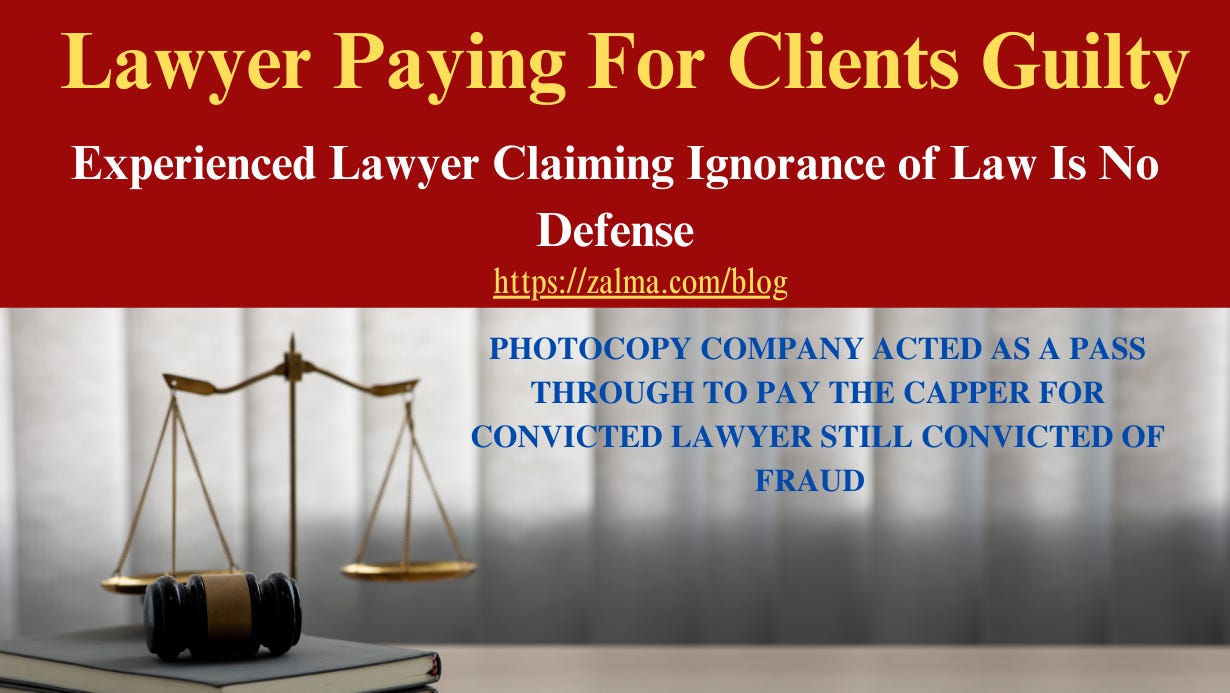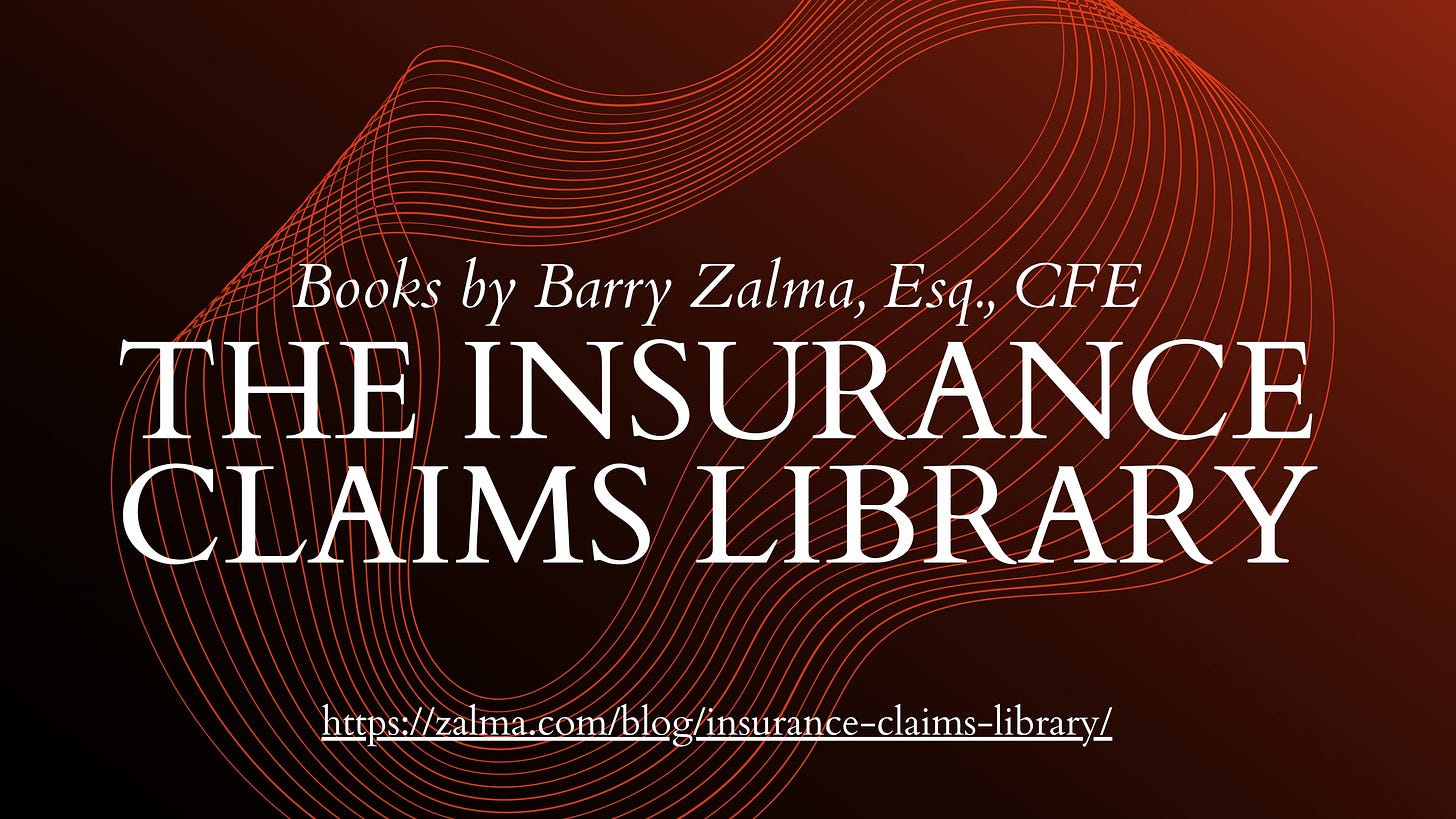Read the full article at https://lnkd.in/gESQU6Hk and see the full video at https://lnkd.in/g86YmUq5 and at https://lnkd.in/gisQvT3V and at https://zalma.com/blog plus more than 4550 posts.
Robert Irving Slater was a practicing worker’s compensation attorney when he entered into an agreement with the owner of USA Photocopy who paid a third party to perform intake interviews with clients of defendant’s practice, saving a significant amount of his the lawyer’s own employees time and money. In exchange, defendant used USA Photocopy’s services during all workers’ compensation proceedings on those cases.
The law prohibits referring workers’ compensation clients for remuneration. Defendant was ultimately convicted of conspiracy, submitting false and fraudulent claims against insurers, and 21 counts of insurance fraud. He was sentenced to probation for two years in The People v. Robert Irving Slater, G061331, California Court of Appeals, Fourth District, Third Division (July 17, 2023) and appealed his conviction.
FACTS
USA Photocopy provided attorney services, including photocopying and sending subpoenas for records for workers’ compensation cases. The company would then bill insurance carriers for its services
Peter Ayala worked as a “legal investigator performing intake services.” Ayala’s role was to meet with the potential “workers’ compensation client to fill out the intake retainer . . . and also get the retainer signed for the claim.”
Ayala was told by the lawyer to send an invoice for his services every two weeks to USA Photocopy, which paid him for his services. Ayala had done similar work in the past for approximately 13 attorneys, and this was the first time he would be paid by a party other than an attorney. Over the six years his relationship with USA Photocopy and defendant lasted, Ayala estimated he performed intake services for about 2,000 clients for defendant, and USA Photocopy was the only copy service used for those clients. Ayala did not perform any service for USA Photocopy other than the services he performed for the lawyer defendant.
Employees from USA Photocopy went to defendant’s offices once or twice a month to obtain records. As the injured worker’s attorney, defendant would authorize all subpoenas that were issued. Each entity would respond to the subpoena with records or by stating they had no responsive records. USA Photocopy would separately bill the cost for each subpoena to the workers’ compensation insurance carrier, regardless of whether the subpoena resulted in the production of documents.
Defendant was convicted of conspiracy submitting a false and fraudulent claim; and 21 counts of insurance fraud based on concealing or failing to disclose information that affects a person’s right to an insurance benefit.
Verdict and Sentencing
The jury convicted defendant on all 23 counts. The jury also found the enhancement regarding the pattern of fraudulent conduct true. The court sentenced defendant to serve a total of 183 days, with 182 of those days suspended on the successful completion of two years of supervised probation. Six months of the probation term was to be served with an ankle bracelet. The court also ordered defendant to pay $356,175.24 in victim restitution in addition to statutory fines and fees.
DISCUSSION
In reviewing the sufficiency of the evidence to support a conviction, the Court of Appeal applied the test whether substantial evidence, of credible and solid value, supported the jury’s conclusions. Appellate courts simply consider whether any rational trier of fact could have found the essential elements of the charged offenses beyond a reasonable doubt. The standard of review is the same even when the case relies on circumstantial evidence and the appellate court must accept logical inferences that the jury might have drawn from that evidence.
To prove defendant guilty of conspiracy and insurance fraud, the prosecution was required to prove defendant conspired to refer clients for compensation in violation of section 3215. Defendant’s only argument is that the evidence did not support that he knew the referral scheme at issue in this case was a crime.
Based on defendant’s level of knowledge and experience, the jury could infer that defendant knew the laws involving what kinds of referrals were lawful and which ones were not in the context of workers’ compensation law. A defendant cannot remain willfully ignorant and then claim a lack of knowledge about the specific law he was violating as a defense to a specific intent requirement.
Further, the very oddness of the scheme involved here – where Ayala was paid by USA Photocopy, rather than by defendant himself – a type of scheme the experienced workers’ compensation attorney and retired Judge Hernandez had never heard of – suggested that something was not aboveboard. The jury was entitled to infer from the oddity of the scheme that defendant, as an experienced attorney, was aware it was illegal.
The lack of a written agreement – something a reasonable jury might consider routine for a lawyer – also suggests knowledge of illegality.
Taken together, and given the substantial evidence standard, the evidence was sufficient for a reasonable jury to infer that defendant was aware that the referral scheme violated the law.
ZALMA OPINION
Slater, an experienced lawyer, should have known – and the jury found he did – that the scheme with the photocopy service and Mr. Ayala, was an attempt to hide capping – causing insurers to pay for the illegal referrals to a lawyer of clients – a crime in California and most states. He received a kind sentence with no jail time and payment of restitution and yet, he appealed. If he doesn’t pay it he will go to jail. Creativity in hiding the scheme did not work and his conviction properly stands.
(c) 2023 Barry Zalma & ClaimSchool, Inc.
Please tell your friends and colleagues about this blog and the videos and let them subscribe to the blog and the videos.
Subscribe and receive videos limited to subscribers of Excellence in Claims Handling at locals.com https://zalmaoninsurance.locals.com/subscribe.
Consider subscribing to my publications at substack at https://barryzalma.substack.com/publish/post/107007808
Go to Newsbreak.com https://www.newsbreak.com/@c/1653419?s=01
Follow me on LinkedIn: www.linkedin.com/comm/mynetwork/discovery-see-all?usecase=PEOPLE_FOLLOWS&followMember=barry-zalma-esq-cfe-a6b5257
Daily articles are published at https://zalma.substack.com. Go to the podcast Zalma On Insurance at https://podcasters.spotify.com/pod/show/barry-zalma/support; Follow Mr. Zalma on Twitter at https://twitter.com/bzalma; Go to Barry Zalma videos at Rumble.com at https://rumble.com/c/c-262921; Go to Barry Zalma on YouTube- https://www.youtube.com/channel/UCysiZklEtxZsSF9DfC0Expg; Go to the Insurance Claims Library – https://zalma.com/blog/insurance-claims-library\
Please tell your friends and colleagues about this blog and the videos and let them subscribe to the blog and the videos.
Subscribe and receive videos limited to subscribers of Excellence in Claims Handling at locals.com https://lnkd.in/gfFKUaTf.
Consider subscribing to my publications at substack at https://lnkd.in/gcZKhG6g
Follow me on LinkedIn: https://lnkd.in/guWk7gfM
Go to Barry Zalma videos at Rumble.com at https://lnkd.in/gV9QJYH; Go to the Insurance Claims Library – https://lnkd.in/gBPMEyqr








Share this post